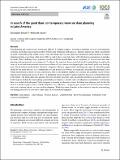Files in this item
In search of the good dam : contemporary views on dam planning in Latin America
Item metadata
| dc.contributor.author | Schulz, Christopher | |
| dc.contributor.author | Adams, William M. | |
| dc.date.accessioned | 2022-01-26T17:30:07Z | |
| dc.date.available | 2022-01-26T17:30:07Z | |
| dc.date.issued | 2021-01 | |
| dc.identifier | 277618115 | |
| dc.identifier | a403e78c-9371-4950-a6c8-f36576cfb926 | |
| dc.identifier | 85092942070 | |
| dc.identifier.citation | Schulz , C & Adams , W M 2021 , ' In search of the good dam : contemporary views on dam planning in Latin America ' , Sustainability Science , vol. 16 , no. 1 , pp. 255-269 . https://doi.org/10.1007/s11625-020-00870-2 | en |
| dc.identifier.issn | 1862-4057 | |
| dc.identifier.uri | https://hdl.handle.net/10023/24758 | |
| dc.description | This work was funded by the Global Challenges Research Fund, Economic and Social Research Council, UK, as part of the FutureDAMS project (grant no. ES/P011373/1). | en |
| dc.description.abstract | Dam planning and construction is notoriously difficult. It is highly complex, involving a multitude of social, environmental, economic, and technological questions that often become politicised in the process; negative impacts are often concentrated on small, vulnerable groups within society, while the benefits are typically spread in a much more diffuse pattern; it requires changing riverine ecosystems, often irreversibly so; and it takes a very long time, with often harsh consequences if mistakes are made. These challenges have generated decades of debate around dams and development, yet it is not clear how dam planning and management can be improved. To address this question, the present study used Q methodology to analyse the views of social and environmental researchers on dams in Latin America on the principles that should guide dam development. The Q analysis rendered three idealised viewpoints: The first suggested that defending the rights of vulnerable people should be the main priority, as a counterbalance to the natural bias towards economically and politically powerful actors within the political economy of dam construction. The second implied adoption of a holistic and scientific vision towards dam decision-making, and a focus of efforts on perfecting formal procedures and participatory processes to build better dams in the future. The third called into question the need for dams altogether, and concentrated attention on invisible and overlooked aspects of dam decision-making, particularly past injustices, and the rights of indigenous communities to determine their own model of development. Each viewpoint represents an alternative vision for future dam planning and clarifies the choices available to policy-makers and development actors. Moreover, viewpoints give insights on the motivations of those who seek to inform debates on dams and development. While they were identified in the context of dam-decision making, our findings may also be relevant to other fields of sustainable development. | |
| dc.format.extent | 735142 | |
| dc.language.iso | eng | |
| dc.relation.ispartof | Sustainability Science | en |
| dc.subject | Dam impacts | en |
| dc.subject | Latin America | en |
| dc.subject | Political ecology | en |
| dc.subject | Q methodology | en |
| dc.subject | River basin planning | en |
| dc.subject | Sustainable water resources development | en |
| dc.subject | G Geography (General) | en |
| dc.subject | E-NDAS | en |
| dc.subject.lcc | G1 | en |
| dc.title | In search of the good dam : contemporary views on dam planning in Latin America | en |
| dc.type | Journal article | en |
| dc.contributor.institution | University of St Andrews. School of Geography & Sustainable Development | en |
| dc.identifier.doi | 10.1007/s11625-020-00870-2 | |
| dc.description.status | Peer reviewed | en |
This item appears in the following Collection(s)
Items in the St Andrews Research Repository are protected by copyright, with all rights reserved, unless otherwise indicated.

